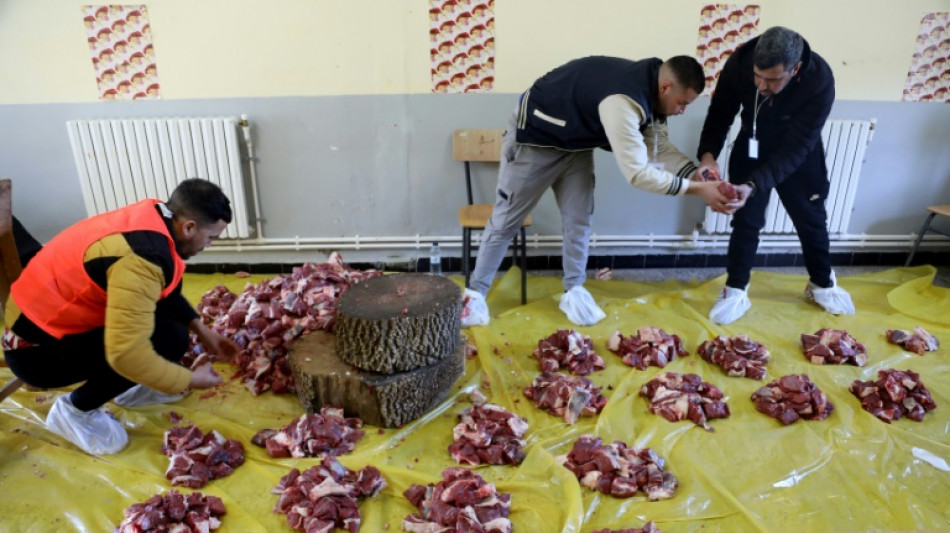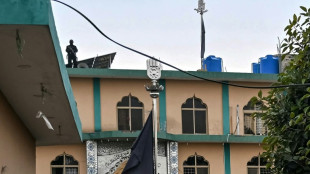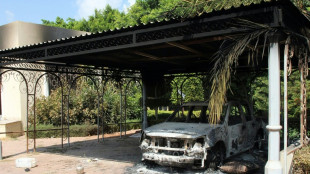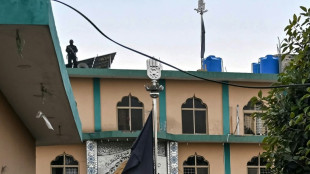
-
 A tale of two villages: Cambodians lament Thailand's border gains
A tale of two villages: Cambodians lament Thailand's border gains
-
Police identify suspect in disappearance of Australian boy

-
 Cuba adopts urgent measures to address energy crisis: minister
Cuba adopts urgent measures to address energy crisis: minister
-
Not-so-American football: the Super Bowl's overseas stars

-
 Trump says US talks with Iran 'very good,' more negotiations expected
Trump says US talks with Iran 'very good,' more negotiations expected
-
Trump administration re-approves twice-banned pesticide

-
 Hisatsune leads Matsuyama at Phoenix Open as Scheffler makes cut
Hisatsune leads Matsuyama at Phoenix Open as Scheffler makes cut
-
Beyond the QBs: 5 Super Bowl players to watch

-
 Grass v artificial turf: Super Bowl players speak out
Grass v artificial turf: Super Bowl players speak out
-
Police warn Sydney protesters ahead of Israeli president's visit

-
 Bolivia wants closer US ties, without alienating China: minister
Bolivia wants closer US ties, without alienating China: minister
-
Ex-MLB outfielder Puig guilty in federal sports betting case

-
 Milan-Cortina Winter Olympics open with dazzling ceremony
Milan-Cortina Winter Olympics open with dazzling ceremony
-
China overturns death sentence for Canadian in drug case

-
 Trump reinstates commercial fishing in protected Atlantic waters
Trump reinstates commercial fishing in protected Atlantic waters
-
Man Utd can't rush manager choice: Carrick

-
 Leeds boost survival bid with win over relegation rivals Forest
Leeds boost survival bid with win over relegation rivals Forest
-
Stars, Clydesdales and an AI beef jostle for Super Bowl ad glory

-
 Dow surges above 50,000 for first time as US stocks regain mojo
Dow surges above 50,000 for first time as US stocks regain mojo
-
Freeski star Gu says injuries hit confidence as she targets Olympic treble

-
 UK police search properties in Mandelson probe
UK police search properties in Mandelson probe
-
Bompastor extends contract as Chelsea Women's boss despite slump

-
 Milan-Cortina Winter Olympics open with glittering ceremony
Milan-Cortina Winter Olympics open with glittering ceremony
-
A French yoga teacher's 'hell' in a Venezuelan jail

-
 England's Underhill taking nothing for granted against Wales
England's Underhill taking nothing for granted against Wales
-
Fans cheer for absent Ronaldo as Saudi row deepens

-
 Violence-ridden Haiti in limbo as transitional council wraps up
Violence-ridden Haiti in limbo as transitional council wraps up
-
Hundreds protest in Milan ahead of Winter Olympics

-
 Suspect in murder of Colombian footballer Escobar killed in Mexico
Suspect in murder of Colombian footballer Escobar killed in Mexico
-
Colombia's Rodriguez signs with MLS Minnesota United

-
 Wainwright says England game still 'huge occasion' despite Welsh woes
Wainwright says England game still 'huge occasion' despite Welsh woes
-
WADA shrugs off USA withholding dues

-
 France detects Russia-linked Epstein smear attempt against Macron
France detects Russia-linked Epstein smear attempt against Macron
-
Winter Olympics to open with star-studded ceremony

-
 Trump posts, then deletes, racist clip of Obamas as monkeys
Trump posts, then deletes, racist clip of Obamas as monkeys
-
Danone expands recall of infant formula batches in Europe

-
 Trump deletes racist video post of Obamas as monkeys
Trump deletes racist video post of Obamas as monkeys
-
Colombia's Rodriguez signs with MLS side Minnesota United

-
 UK police probing Mandelson after Epstein revelations search properties
UK police probing Mandelson after Epstein revelations search properties
-
Russian drone hits Ukrainian animal shelter

-
 US says new nuclear deal should include China, accuses Beijing of secret tests
US says new nuclear deal should include China, accuses Beijing of secret tests
-
French cycling hope Seixas dreaming of Tour de France debut

-
 France detects Russia-linked Epstein smear attempt against Macron: govt source
France detects Russia-linked Epstein smear attempt against Macron: govt source
-
EU nations back chemical recycling for plastic bottles

-
 Terror at Friday prayers: witnesses describe blast rocking Islamabad mosque
Terror at Friday prayers: witnesses describe blast rocking Islamabad mosque
-
Iran expects more US talks after 'positive atmosphere' in Oman

-
 US says 'key participant' in 2012 attack on Benghazi mission arrested
US says 'key participant' in 2012 attack on Benghazi mission arrested
-
Why bitcoin is losing its luster after stratospheric rise

-
 Arteta apologises to Rosenior after disrespect row
Arteta apologises to Rosenior after disrespect row
-
Terror at Friday prayers: witness describes 'extremely powerful' blast in Islamabad


Centuries-old Algerian indigenous tradition champions sharing
In a village nestled in the mountains of northeastern Algeria, locals and visitors gathered under a cold winter sky to celebrate Tamechrit, a centuries-old Berber tradition rooted in sharing.
Seeking to preserve a practice that faded during the Algerian civil war of the 1990s, villagers marked Tamechrit with Berber music and food on the occasion coinciding in January with the Amazigh new year.
The minority community of Berbers refer to themselves as the Amazigh, meaning "free people". They have long fought for recognition for their ancient culture and language in modern states across North Africa.
Berbers are descendants of pre-Arab North Africans, whose historic homelands stretched from the Canary Isles and Morocco to the deserts of western Egypt.
"We hope to perpetuate this tradition during cultural or religious festivals," bringing together different people from the village and even those who have left, Dahmane Barbacha, a 41-year-old from Ath Atig village, told AFP.
Children wore temporary Amazigh face tattoos at the event that dates back to the 13th century, according to historian Saleh Ahmed Baroudi.
Tamechrit means "offering" in Tamazight, the community's language recognised as an official language alongside Arabic in Algeria.
It represents "an occasion for gathering, fraternity, and reconciliation between families" across Amazigh villages, said Baroudi, who teaches contemporary Algerian history.
Different regions of the country use other names for the custom, he added.
The merrymaking is also held to observe major Islamic events such as the fasting month of Ramadan, Prophet Mohammed's birthday, and Ashura.
It is often held in Zawiyas, small places for worship and religious teaching, usually where a local saint or holy figure lived and was buried.
Baroudi said most of those sites are in mountainous regions, adding to the "spiritual dimension" of Tamechrit.
- Reconciliation -
The festival begins days in advance, when men from the village collect donations to purchase cattle whose meat is later distributed equally among families.
During the event a communal meal -- usually couscous prepared by village women -- is served to everyone, regardless of social standing.
Ammar Benkherouf, a 36-year-old living in France, said he has been taking annual leaves in recent years to attend the ceremony.
"I can't describe the happiness it brings me to help keep this heritage alive," he told AFP.
By midday, the communal couscous is served to villagers and visitors while volunteers distribute the portioned meat around the village's households.
Tamechrit had also been a tool for fostering solidarity during Algeria's Independence War against French colonial rule from 1954-1962, according to Baroudi.
The ritual then faded during the country's civil war between 1992 and 2002, a conflict between authorities and Islamist groups that claimed the lives of around 200,000 after the Islamic Salvation Front (FIS) party won municipal and legislative elections.
Tamechrit then "made a comeback in the early 2000s" with the end of the civil war, said Baroudi.
Today, Tamechrit continues to bring together villagers and resolve conflicts between them.
Farhat Medhous, a 31-year-old who heads a cultural association in Ath Atig, said his group now looks to "restore women's participation in these traditions inherited from their ancestors".
He said that, traditionally, women held their own gatherings in a separate area from the men's, but their involvement diminished even after the civil war.
In addition, he added, the association aims at teaching the younger generations Tamechrit values, meaning sharing and reconciliation.
He said this year's festivity was organised by villagers aged 18 to 40.
"We have held activities for children to teach them the values of volunteerism and community," said Medhous. "This prepares them to preserve these traditions as they grow older."
M.AlAhmad--SF-PST


